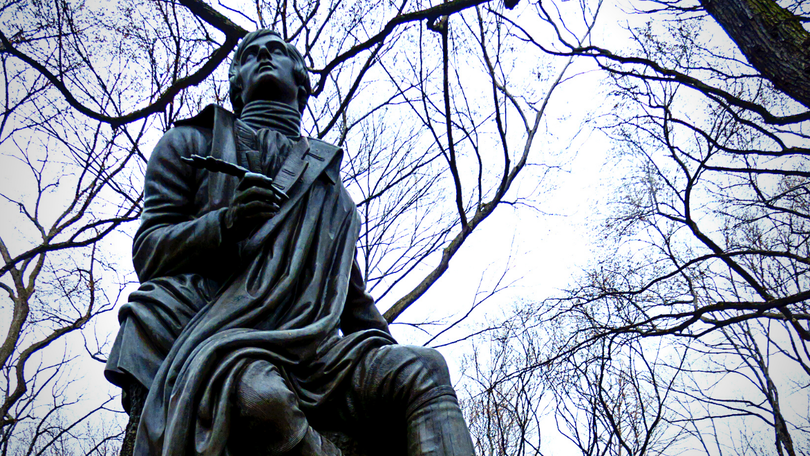|
The Call for Compassion
Read the full story ⬇︎
Advice of Mischievous Mice
A group of mice is called a mischief. This makes sense, considering how in the course of a year a single pair of mice can potentially multiply into 8,000 rodents. Just think of all the mischief they can get into! We can’t really fault them for their mischief, though; after all, their highest aim is to merely survive the day. Mice are blessed with a non-attachment, neither looking backwards nor forwards with rumination or worry of what was and what might be. Only the present touches them, for their eyes look solely onto the needs of the day, come what may. Humans, though, are an entirely different kind of creature. We have a much harder time letting go, and are often instead compelled to ruminate and worry, passing blame and speculation backwards and forwards. Compound this attachment with projection, deception, and misconception—whether real or perceived—and we can sometimes feel robbed of desired joy, left with nothing but fodder for grief and pain. If we allow it, perhaps we can learn much from the advice of mischievous mice. Perhaps. The Demise of the Inca Empire
To learn how to be more present in each and every moment we can look to the demise of the Inca Empire. The population of 10 million people took a rather mousey approach after being conquered by only a few hundred Spanish conquistadors. When their rulers—whom they viewed as gods—were ruthlessly and publicly murdered, the general population of the empire readily accepted their situation as “what was done.”
They had no worry over the past, because what’s done is done; and they had no concern for what lay ahead, because no one knows what the future may hold. However, what is certain and what can be controlled is what can be done to tend to the needs of the day. Whether by design or by default, there is certainly plenty of mischief to be had, but the truly compassionate thing to do, regardless of what happens, is to merely tend to the needs of the day. If it can work for the aim of Incas and mice, it can work for us too. The Ploughman Poet
Robert Burns knew full well the value of tending to the needs of the day. Regarded as the national poet of Scotland and affectionately known as the Ploughman Poet, Burns’ poetry was celebrated worldwide. Despite his fame, he spent much of his life tending his farm.
And that’s where he was one November day in 1785, when he composed one of his most famous poems, entitled “To a Mouse.” After accidentally running over a mouse’s nest with his plough, he waxed poetic about the fate of the poor mouse put out by the accident. Here’s a translation of a brief excerpt from the final three stanzas that are particularly noteworthy: Now you are turned out, for all your trouble, Without house or holding, To endure the winter's sleety dribble, And hoar-frost cold. But Mouse, you are not alone, In proving foresight may be vain: The best-laid schemes of mice and men Go oft awry, And leave us nothing but grief and pain, For promised joy! Still you are blessed, compared with me! The present only touches you: But oh! I backward cast my eye, On prospects dreary! And forward, though I cannot see, I guess and fear! Of Mice and Men
It is certainly true that the best-made plans of mice and men do indeed often go awry, and that’s certainly true for George and Lenny, the displaced migrant workers portrayed in John Steinbeck’s 1937 novella, Of Mice and Men. Plans to start their own homestead were thwarted by circumstance, ultimately leading to Lenny’s untimely demise. It’s easy to see the parallels between this pair of men and the Ploughman Poet’s displaced field mouse, yet without passing judgment, Steinbeck offers a refreshing perspective of plans gone awry.
This perspective is highlighted in the original working title for the novella, originally set to be called Something That Happened. This title seems especially appropriate, considering something that happened early in the development of the book. After finishing the first draft, Steinbeck's dog ate half the manuscript, leaving nothing but confetti sprinkled across the floor. Rather than getting angry at the dog, Steinbeck took solace knowing the dog had no malice. Instead, he playfully wondered, perhaps the dog was merely offering criticism? His graceful handling of this episode bears a striking resemblance to the demise of the Inca Empire. It’s simply “what was done.” Something that happened. An accident, with no one really to blame. No need to ruminate. No need to wonder whether he can rewrite it. Best just to tend to the needs of the day and start again. It was around this time that Steinbeck, by chance, stumbled upon Robert Burn’s poem “To a Mouse,” where he read the now famous line: “The best-laid schemes of mice and men Go oft awry,” and knew immediately that this was the appropriate title for his now classic novella. Yes, the best made plans of mice and men do often go awry. So what’s the solution? Do we fester in negative rumination, play the blame game, or perhaps double down on our sunk costs and risk losing even more? Or do we instead do as the mice and Incas do? The Call for Compassion
“What’s with all the compasses?”
I was truly perplexed by all the compasses I was finding, because they didn’t look like what I thought I was looking for. To help promote my course Creating Compassionate Connections, I was searching the internet for royalty free images to represent the concept of compassion, but couldn’t find anything that spoke to me. Instead, all I found were a bunch of images featuring compasses. It took perhaps longer than necessary, yet precisely as long as it did, before it finally dawned on me that the word compass is encompassed within the word compassion. And that’s when it all became clear. I knew why George did what he did at the end of Lenny’s life. I knew how Robert felt when he destroyed the field mouse’s home. I knew why the Incas accepted their fate. And I knew why the past and future don’t bother mice, regardless of their mischief. It’s because they are directed by compassion. The word compassion combines the word-forming element com (meaning “with, together, by”) and the word passion (meaning “suffering, enduring, emotion"). In this way, the word compassion literally means “with passion, with suffering, with enduring emotion.” And today, we typically use the word compassion to refer to the heart-felt concern felt for the sufferings or misfortunes of others. Though the etymology of the word compassion has nothing to do with the word compass, its presence within the word can have a significant metaphoric meaning if we allow it. As a navigation tool, the compass is used to help travelers orient themselves within their environment, providing direction for safe passage on a journey. In this way, by combining the word compass with the word passion, we arrive at a new understanding for what compassion might mean, if we allow it: At its highest aim, to have compassion is to be led by the heart, encouraging us to help one another when plans go awry, providing direction for safe passage on our shared life journey. No Need For Mischief
This new understanding of compassion reveals that, by definition, it requires a relationship between at least two or more people. As a popular proverb reminds us:
“If you want to go fast, go alone; but if you want to go far, go together.” Yet if we’ve learned anything from mice and men, it’s that two or more together welcomes mischief, reflected in another reminder that the ones we love the most are also often the ones who can hurt us the most. And this is why the choice of compassion has such lasting value for our shared journey, offering the opportunity to work together constructively rather than against each other destructively. Rather than approaching one another as adversaries, we can instead choose to approach our relationships as co-conspirators on a shared journey forward. We can choose to fester in negative rumination, play the blame game, and double down on sunk costs, or we can choose to respond like George and Lenny, like the Ploughman Poet, and like the mice and the Incas—seeking to understand the needs of the day and responding in kind, led by the heart. The Highest Aim
Why does any of this matter?
John Steinbeck believed that the highest aim of honest writing is to understand people. In a journal entry from 1938, he wrote: “If you understand each other, you will be kind to each other. Knowing a man well never leads to hate and nearly always leads to love.” And though they lived centuries and an ocean apart, Robert Burns seems to have agreed, living by the ancient Greek maxim “Know thyself,” believing “the chiefest study of mankind is man.” In other words, to know and understand others, it requires first knowing who you are—for how can you be led by the heart if you don’t know your heart? This matters because the best made plans of mice and men often go awry. Choosing to be led by the heart through compassionate connection with others will help to collectively tend to the needs of the day with kindness, respect, and dignity, using our influence as a force for good regardless of "what was done."
Jonas Cain is an educator, facilitator, and coach for Hashtag Positivity, helping emerging leaders and their influencers experience joy in their life, work, and relationships. Schedule a strategy session with him today to discuss your challenges, goals, and obstacles.
0 Comments
Leave a Reply. |
AuthorJonas Cain, M.Ed. is a storyteller, magician, musician, and facilitator of fascination on a mission to help you experience abiding joy. Topics
All
SubscribeArchives
July 2024
|




















 RSS Feed
RSS Feed
